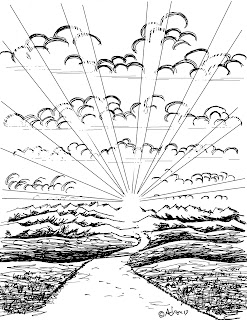WE ALL HAVE TIMES WHEN...
We all have times when we feel misunderstood. Sometimes we feel that we will never be understood or known. So, we ask Does anyone believe in me?
I thought about that question and those feelings when I wrote the poem, YES, IT IS ABOUT YOU, A Poem of Because. It is in my book of poems BEYOND THESE DARK LANDS ARE EDGES OF JOY. A collection of poems of comfort and hope.
THE TITLE
We are taught as children not to be selfish. Our modern culture says life is not about you but it is about community, service, family, and all those things that we must surrender our interest to and all our needs. But there are times when it is about you, and it is not selfishness, conceit, and vanity to think so.
If God loves you so much and sent His only Son to die for you to pay for your sins then it is about you
THE STRUCTURE
All the poems in this book are short and this one is only 20 lines long. It is comprised of a series of triplets each one starting with the phrase, "I believe you." Though the phrase, "I believe you," is repeated several times and thus runs the risk of being redundant or boring, it builds up a rhythm that makes the last line more impactful. Each triplet has a statement of faith in the reader to experience different blessings.
YES, IT IS ABOUT YOU,
A Poem of Because
I believe you
Will get through this day
And have a tomorrow.
I believe you
Will find God’s love,
His peace, and His joy.
I believe you
Will become stronger,
And find hope and courage.
I believe you
Are an inspiration
And others will ask how.
I believe you
Will be a blessing
And people will be grateful
For you.
I believe you
Will rise far higher
Than ever before.
I believe
That there are many
Who believe in you,
I only ask
That you believe.
THE MEANING
The meaning is simple. It is not that I believe in you but that you are believed in. Not only are you believed in you are believed in by many people.
THE ILLUSTRATION
I used a very simple image of clouds and the rays of the sun. The dawn star which is a typification of Christ is in the upper left corner of the picture.
THE SCRIPTURE
The Bible verse that I chose for this poem is John 7:38. It is a verse that offers a promise that if we come to Him we will not only find fulfillment but we will be a fountain of blessings to other people.
John 7:38 says,
Anyone who believes in Me may come and drink! For the Scriptures declare, 'Rivers of living water will flow from his heart.’ John 7:38, NLT
I cannot tell you how true this poem is in my heart for you. I believe we all have potential and we all are capable of being a blessing to everyone around us.



















